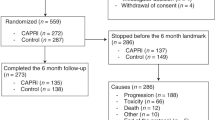Abstract
Purpose
Real-time symptom monitoring using a mobile phone is potentially advantageous for patients receiving oral chemotherapy. We therefore conducted a pilot study of patient dose adaptation using mobile phone monitoring of specific symptoms to investigate relative dose intensity of capecitabine, level of toxicity and perceived supportive care.
Methods
Patients with breast or colorectal cancer receiving capecitabine completed a symptom, temperature and dose diary twice a day using a mobile phone application. This information was encrypted and automatically transmitted in real time to a secure server, with moderate levels of toxicity automatically prompting self-care symptom management messages on the screen of the patient’s mobile phone or in severe cases, a call from a specialist nurse to advise on care according to an agreed protocol.
Results
Patients (n = 26) completed the mobile phone diary on 92.6 % of occasions. Twelve patients had a maximum toxicity grade of 3 (46.2 %). The average dose intensity for all patients as a percentage of standard dose was 90 %. In eight patients, the dose of capecitabine was reduced, and in eight patients, the dose of capecitabine was increased. Patients and healthcare professionals involved felt reassured by the novel monitoring system, in particular, during out of hours.
Conclusion
It is possible to optimise the individual dose of oral chemotherapy safely including dose increase and to manage chemotherapy side effects effectively using real-time mobile phone monitoring of toxicity parameters entered by the patient.





Similar content being viewed by others
References
Brearley S et al (2010) Clinical features of oral chemotherapy: results of a longitudinal prospective study of breast and colorectal cancer patients receiving capecitabine in the UK. Eur J Cancer Care 19(4):425–433
Lyman GH et al (2004) Incidence and predictors of low chemotherapy dose-intensity in aggressive non-Hodgkin’s lymphoma: a nationwide study. J Clin Oncol 22(21):4302–4311
Citron ML (2004) Dose-density in adjuvant chemotherapy for breast cancer. Cancer Investig 22(4):555–568
Kimmel SRM, Kimmig R, Schmid P (2007) Dose-dense chemotherapy for primary breast cancer. Curr Opin Obstet Gynecol 19(1):75–81
Evans WE et al (1998) Conventional compared with individualized chemotherapy for childhood acute lymphoblastic leukemia. N Engl J Med 338(8):499–505
Department of Health (2013) NHS Improvement and Macmillan Cancer Support, Living with & beyond cancer: taking action to improve outcomes. Department of Health
Weaver A et al (2007) Application of mobile phone technology for managing chemotherapy-associated side effects. Ann Oncol 18:1887–1892
UKONS Oncology/haematology 24 hour triage rapid assessment and access tool kit. 2011. [online]. 2011 [cited 2013 01 February ]; Available from: <http://ukons.org/>
Adams R et al (2009) Toxicity associated with combination oxaliplatin plus fluoropyrimidine with or without cetuximab in the MRC COIN trial experience. Br J Cancer 100(2):251–258
Cassidy J et al (2008) Randomized phase III study of capecitabine plus oxaliplatin compared with fluorouracil/folinic acid plus oxaliplatin as first-line therapy for metastatic colorectal cancer. J Clin Oncol 26(12):2006–2012
Chang H et al (2011) Adjuvant chemotherapy using a tailored-dose strategy in elderly patients with colon cancer. Ann Oncol 23(4):911–918
NCAG National chemotherapy advisory group, chemotherapy services in England: ensuring quality and safety. 2009. [online]. [Date accessed 01st February 2013]. Available from world wide web: <http://www.dh.gov.uk/en/Publicationsandstatistics/Publications/DH_104500> 2009
Acknowledgments
Our thanks go to the patients who gave their time to help with this research and to Professor David Kerr for advice on the design of the trial. Our appreciation is afforded to the recruiting doctors Dr. Nicky Levitt and Dr. Claire Jacobs. We also thank the wider trial management team for their input including Sarah Pearson, Pamela Leighton, Barbara Stafford and Barry Crossman. The trial was supported by the NIHR Biomedical Research Centre, Oxford and the Vodafone UK Foundation.
Conflict of interest
LT was a co-founder of t+ Medical, the company which hosted the study server. All remaining authors have declared no conflict of interest.
Funding
This work was supported by the National Institute for Health Research Biomedical Research Centre, Oxford; and the Vodafone UK Foundation.
Author information
Authors and Affiliations
Corresponding author
Electronic supplementary material
Below is the link to the electronic supplementary material.
ESM 1
(DOC 165 kb)
Rights and permissions
About this article
Cite this article
Weaver, A., Love, S.B., Larsen, M. et al. A pilot study: dose adaptation of capecitabine using mobile phone toxicity monitoring — supporting patients in their homes. Support Care Cancer 22, 2677–2685 (2014). https://doi.org/10.1007/s00520-014-2224-1
Received:
Accepted:
Published:
Issue Date:
DOI: https://doi.org/10.1007/s00520-014-2224-1




